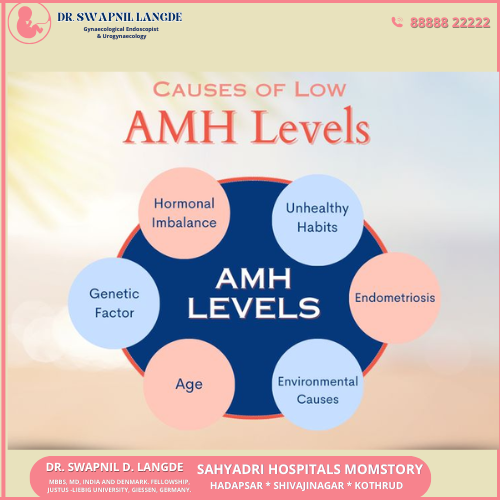If you’ve been trying to conceive and have come across the term “AMH” in your fertility evaluations, you’re not alone. AMH, or Anti-Müllerian Hormone, is a crucial marker used to assess a woman’s ovarian reserve—essentially, how many eggs she has left. Low AMH levels can be concerning, especially for women trying to conceive, but understanding the causes can help you make informed decisions about your fertility journey.
What is AMH?
Anti-Müllerian Hormone (AMH) is produced by small follicles in the ovaries. The amount of AMH in your blood gives doctors an idea of your egg reserve. While AMH does not predict the quality of your eggs, it does provide insight into quantity. Low AMH levels suggest a reduced ovarian reserve, which can affect fertility potential.
What Causes Low AMH Levels?
1. Age
One of the most common reasons for low AMH is age. As women get older, the number of eggs naturally declines. This decline usually begins in the late 20s and becomes more significant after age 35.
2. Genetic Factors
Some women may be genetically predisposed to having a lower ovarian reserve. Conditions like Turner syndrome or a family history of early menopause can influence AMH levels.
3. Autoimmune Disorders
Certain autoimmune diseases can attack the ovaries, damaging the follicles and reducing AMH levels. These disorders may go undiagnosed until fertility issues arise.
4. Lifestyle Factors
Smoking, excessive alcohol intake, poor diet, and high levels of stress can negatively impact ovarian health and reduce AMH levels.
5. Medical Treatments
Chemotherapy, radiation therapy, or ovarian surgeries can damage the ovaries, leading to a significant drop in AMH levels.
6. Polycystic Ovary Syndrome (PCOS) – Exception to the Rule
Interestingly, women with PCOS often have high AMH levels due to an increased number of small follicles. However, in some cases, PCOS can still lead to poor egg quality and irregular ovulation.
7. Endometriosis
Women with endometriosis may experience reduced ovarian reserve due to inflammation or surgical treatment for endometriotic cysts, which can lead to lower AMH levels.
What Should You Do If You Have Low AMH?
Low AMH levels do not mean pregnancy is impossible—they simply indicate that time might be a critical factor. There are many fertility treatment options available, such as:
-
IVF (In-Vitro Fertilization)
-
Ovarian stimulation protocols tailored for low AMH
-
Fertility preservation through egg freezing
Final Thoughts by Dr. Swapnil Langde
Every woman’s fertility journey is unique. At our fertility clinic, we take a personalized approach to help you understand your AMH levels and explore all possible options. Early assessment and intervention can make a significant difference.
If you’ve been diagnosed with low AMH or are worried about your fertility, book a consultation today. Together, we’ll take the next step toward your dream of parenthood.

